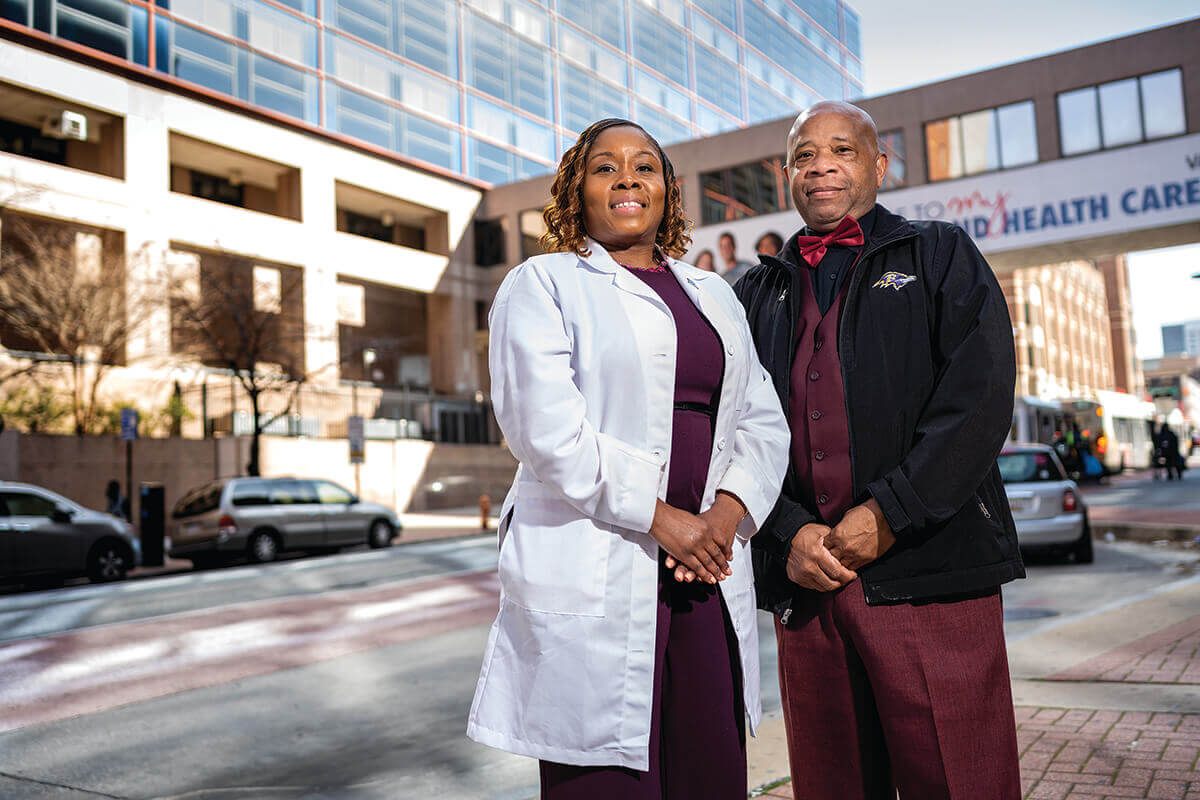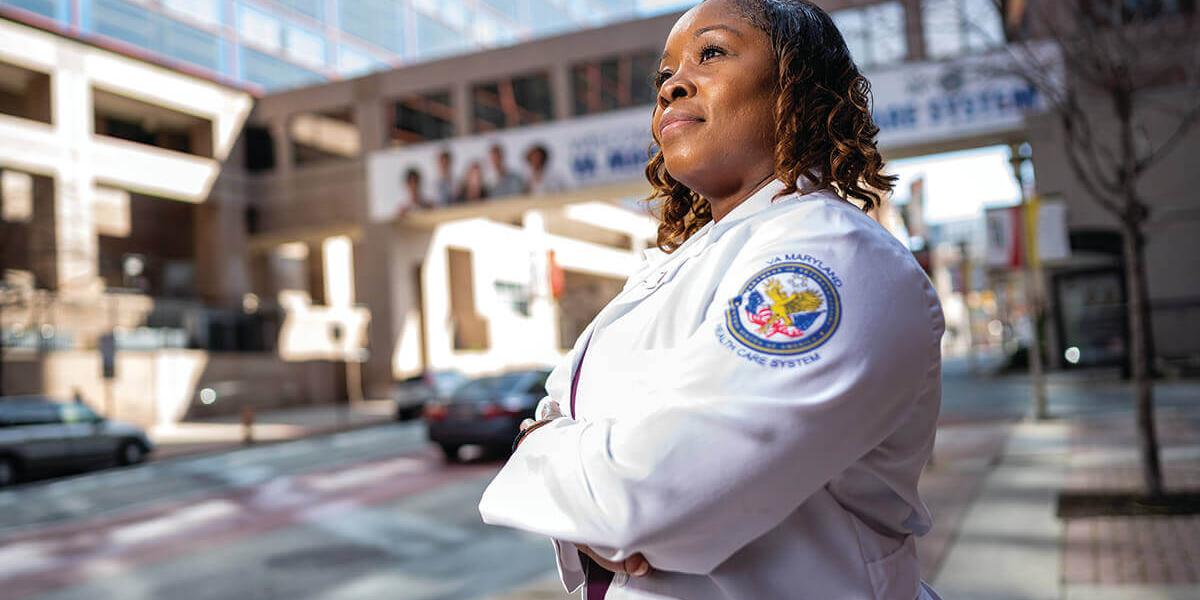Health & Wellness
A Fight on Two Fronts
Caring for vets, then coping with COVID, means double duty for VA Nurse Lt. MeShondra Collins.
A WAVE OF POSITIVE ENERGY follows Lt. MeShondra Collins as she makes her way across the fourth floor of the Baltimore VA Medical Center, home to the medical and cardiac ICUs, called MICUs, which she oversees as a nurse manager.
Bubbly and outgoing, Collins, 41, greets or chats with the doctors, patients, and support staff she passes, effortlessly recalling the names of even short-term patients. Since she first arrived at the Baltimore branch of the VA Maryland Health Care System as an intensive-care nurse in 2014, Collins has quickly risen into leadership. Her patients and colleagues affectionately call her “Meme” (Mee-mee).
“A lot of times, my rounds are long, probably because I talk more than everybody,” she says with a laugh as she begins to loop through the MICU’s 10 beds. But she points out that those seemingly breezy conversations serve a purpose. As she gets to talking with patients or staff, they share ideas with her or offer feedback that she might otherwise miss. Sometimes, it’s just a word of support, with patients sharing how welcomed they feel in her units. “That’s my proudest thing, because as long as that’s the feedback I’m getting, I’ve done my job. The nurses are doing what they see me do all the time.”
“A career in nursing wasn’t foremost in her mind as a young woman, nor was military service.”

As a Navy veteran herself, she has an easy rapport with patients like Ernest Jordan, who has been in bed No. 10 for two days. An Army veteran who retired as a chief petty officer after 22 years of service, Jordan received a kidney transplant at the Pittsburgh VA Medical Center in 2017 and has been treated at the Baltimore VA center for years. When Collins learns that Jordan’s daughter and granddaughter didn’t follow him into the Army, but rather enlisted in the Navy, she gently teases him about their excellent taste in armed services.
But no matter the branch, at the core of Collins’ identity is the idea of being a veteran serving veterans.
However, that commitment to service was severely challenged when the pandemic arrived early in the year, putting a whole new type of pressure on Collins and her staff.
True to form, Collins tackled the challenge as she does any other—as a leader that empowers her team to provide the best care possible.
The hospital ICUs had a fairly low patient load when the first patients tested positive for COVID-19, giving Collins and her team time to develop a surge plan. They identified ICU clinicians throughout the hospital and trained more than 50 support staff on the inner workings of the ICU to prepare for potential surges in patients.
When 39-year-old Navy veteran Jamal Thomas arrived at the Baltimore VA emergency room in May, he was experiencing flu-like symptoms. After being diagnosed with the coronavirus, Thomas’ body quickly began shutting down.
A team of specialists—including cardiologists, nephrologists, and infection-control experts—worked together to treat his several organs attacked by the virus.
Collins led the team of nurses providing his round-the-clock care. A partnership with telehealth services supplied COVID-19 patients with iPads, allowing the nurse team to reduce their exposure while remaining face-to-face, albeit virtually, to tend to the patient’s immediate needs.
Collins bonded with Thomas over their shared Navy service. “We ensure that all of our patients know that we honor them and the sacrifice that they have made,” she says. “Therefore, COVID or not, it is our continued pleasure to serve those whom have served.”
After 30 days at the VA Center, Thomas stabilized and was cleared to return home in late June. “I will never take life for granted again,” he says. “I just want to grab hold of my kids and tell them I love them.”
Collins is most proud of how her team of nurses and hospital staff have stepped up to the challenge. “Instead of running from the unknown, my staff has been on the frontline,” she says. “Though some us are willingly placing ourselves in the vicinity of exposure, they do not complain, they show up to do the work.”
Giving hope to patients like Thomas drives Collins to better herself, and her team, every day. Some weeks, she works seven days, leaving the VA hospital on Friday night to report Saturday morning to the Baltimore Navy Operations Support Center (NOSC), which is responsible for the readiness of reserve sailors and the mobilization and demobilization process.
But despite her total focus on her job and pride in what she does, a career in nursing wasn’t foremost in her mind as a young woman, nor was military service.
While growing up in Georgia, Collins dreamed of becoming a journalist. “I truly wanted to be Oprah,” she recalls with a smile. But eager to assert her independence and relieve her family of financial burden, Collins joined the military in 1997, just two days after she graduated from high school. She served as a Navy Aviation ordnanceman—that’s handling guns, bombs, and missiles on a smaller, “assault-class” aircraft carrier—on the USS Bonhomme Richard for four years, becoming a “shellback,” the term given to shipmates who have crossed the equator. (Yes, the ship is the same one that was in the headlines in July after it caught fire in a shipyard.) And then she gave birth to twin sons in 2000. As a mom and new wife, Collins left the active-duty Navy in 2001, working several jobs before landing in nursing.
One of those jobs was as a 911 dispatcher in San Diego. She remembers the day she got a call from a Vietnam veteran on the brink of suicide. It would shape her entire career.
“He told me, ‘Nobody wants to hear anything I have to say.’ I replied, ‘Sir, I’m 22, I just finished my term in the Navy, but you’re right, I don’t know what you went through. And I’m willing to listen to you,’” Collins recalls. As she listened, she dispatched police and medical to his residence. Later, he would thank Collins for saving his life.
“In my journey toward becoming a nurse, that call is the biggest thing that sticks with me,” she says. “If I wasn’t patient, if I wasn’t willing to listen, and wanted to tell him what to do rather than him telling me how he felt, he could have potentially taken his own life.”
Collins’ empathetic ear has proven to be one of her biggest strengths as a nurse.
After the stint as a 911 operator, she got a job in an investment banking office while raising her sons, but Collins felt unfulfilled. “I love to be around people. I love the idea of service. I love the idea of community. And I love the idea of being a servant of the community, helping in some type of way similar to Florence Nightingale, the lady with the lamp,” she says, gesturing to the ceramic lamp of knowledge on her office shelf, a symbol of the nursing community often received upon completion of a nursing degree.
So in 2006, she used the G.I. Bill to enroll in nursing school at Augusta State University. After graduating, she worked at the Charlie Norwood VA Medical Center in Augusta, Georgia, serving active-duty soldiers and veterans with spinal-cord injuries. Many of her patients were young para- and quadriplegics.
Collins says she never questioned working in the VA system. “I just felt like veterans get pegged as this complex group of people. PTSD is often associated with veterans—psychological issues, that we’re unapproachable, maybe aggressive due to things we’ve seen in war,” Collins says of the common stereotypes. “And I just felt like, why wouldn’t I serve my own brothers and sisters in arms?”
After a divorce, Collins landed in Maryland, armed with a master’s in nursing from Western Governors University. Joining the Baltimore VA as a MICU floor nurse, she was promoted to assistant nurse manager thanks to her advanced degree. Today, Collins, who became a commissioned officer in the Navy Reserves in 2015, oversees 50 nurses across the units she manages. She’s on track to earn her doctorate of nursing this year.
“Working in management allows me to take my passion and find other nurses who have the same passion, and help them grow,” she says.
One of Collins’ proudest achievements at the Baltimore VA hospital is the expansion of the Final Salute program. When veterans pass away, the program honors them and their family in a ceremony that includes a visit from the chaplain, draping the body in the veterans’ flag, and ringing a Tibetan singing bowl. A hospitalwide announcement is made, and any available veterans in the building line the path from the patient’s room to the morgue, saluting the deceased veteran and the family as they pass.
Despite her hectic schedule—she also often works at night on her Ph.D.—everything Collins does builds her passion for serving others, especially fellow veterans.
“I could work anywhere,” she says. “But nothing feels like home and comfort more so than coming into these walls that are built off the backs of people who took the same oath that I took. Serving them as patients allows me to continue to honor them.”
